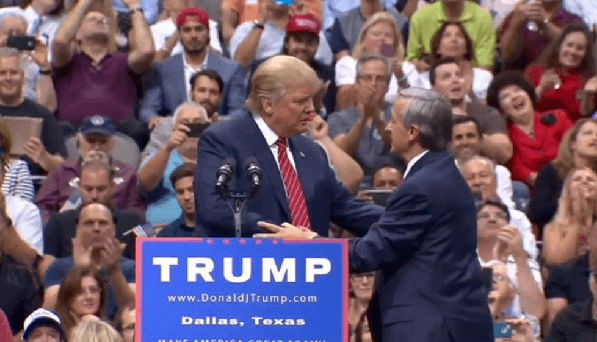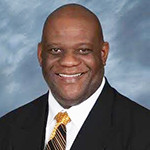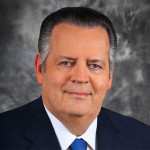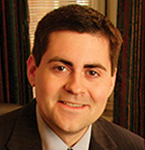The African-American pastor who initiated this summer’s Southern Baptist Convention resolution denouncing the alt-right urged other members of President Trump’s evangelical advisory board to follow the lead of a New York City pastor who stepped down in protest of the president’s remarks about the Aug. 12 white supremacist march in Charlottesville, Va.
“It’s making the church look bad that they are propping up a man who is giving cover to blatant racism,” Dwight McKissic, pastor of Cornerstone Baptist Church in Arlington, Texas, said of the president’s evangelical supporters at a Sunday night conference on race and the alt-right at his church.
A.R. Bernard, senior pastor of the Christian Cultural Center in Brooklyn, resigned Aug. 18 as one of the president’s spiritual advisers after violence surrounding a Unite the Right rally protesting planned removal of a Confederate monument left three dead and dozens injured, citing “a deepening conflict in values” with the administration.
Trump’s immediate response that “many sides” were responsible for the tragedy — seemingly equating the alt-right and neo-Nazi groups behind the rally and clergy and others in Charlottesville to counter the message — prompted a mass exodus from and eventual disbanding of Trump’s economic advisory and manufacturing councils.
During a panel discussion at the Aug. 20 conference planned by him and two other Southern Baptist pastors in the Dallas-Fort Worth area, McKissic said he believes the president’s evangelical advisory group — which includes two past presidents of the Southern Baptist Convention and former Ethics and Religious Liberty Commission head Richard Land — should do the same.
“To me you are giving an endorsement of racism if Trump cannot … call the alt-right specifically by name and say they are racist and wrong,” McKissic said. “I think it speaks poorly of evangelicals that they’re letting Trump by with that. That’s my opinion.”
The 24 remaining members of the evangelical council have been roundly criticized for not taking a stronger stand against Trump’s remarks about Charlottesville.
Some members of the evangelical panel, such as Liberty University President Jerry Falwell Jr. and Pastor Robert Jeffress of First Baptist Church in Dallas, defended Trump against his critics.
Falwell, son of Moral Majority founder Jerry Falwell, praised Trump’s “bold [and] truthful statement” about Charlottesville.
“If we’re going to denounce some racism, we ought to denounce all racism, and I believe that was the point the president was making,” Jeffress, one of the first evangelical leaders to embrace Trump’s presidential campaign, told CBN.
Others, like former SBC presidents Ronnie Floyd and Jack Graham, denounced white supremacy without getting into the controversy about Trump.
“White supremacy and its movements are evil to the core and are to be condemned,” Graham, pastor of Prestonwood Baptist Church in Plano, Texas, tweeted Aug. 12. “There is no place for this in America.”
Floyd, announced earlier this week as next president of the National Day of Prayer, described white nationalism and white supremacy as “anathema to the teachings of Christ.”
Land, now president of Southern Evangelical Seminary in Charlotte, N.C., said he was dissatisfied with Trump’s response to Charlottesville but believes the president’s statement about “many sides” was “misconstrued and misunderstood.”
Land released a statement Aug. 24 saying he’s received many emails urging him to distance himself from Trump, but he is staying on the evangelical advisory council.
“A leader presented with the challenges that President Trump is facing needs counsel and prayer from Bible-believing servants now more than ever,” Land said. “Now is not the time to quit or retreat, but just the opposite — to lean in closer.”
McKissic said the Southern Baptist Convention “wouldn’t look very good right now” if messengers had not adopted a revised version of his resolution condemning the alt-right that was originally not reported out of committee. He credited SBC President Steve Gaines, pastor of Bellevue Baptist Church in Cordova, Tenn., and a guest at Sunday night’s program, for helping to get it through.
“Although Russell Moore, myself and others have gotten a lot of credit, without the leadership and determination of Dr. Steve Gaines, the resolution that was passed that made it clear where the Southern Baptist Convention stands on the alt-right, not knowing what was going to happen in Charlottesville, but had we not passed that resolution we wouldn’t look very good right now,” McKissic said.
Moore, Land’s successor as president of the Southern Baptist Convention’s top spokesman for public policy and religious liberty concerns, was harshly critical of Trump and his evangelical enablers during the campaign, drawing rebuke from the candidate himself, threats to withhold funds for the denomination and speculation that he might lose his job.
In his contribution to National Review’s “conservatives against Trump” issue in February 2016, Moore said the only way the thrice-married billionaire and reality television star who made millions off a casino industry could win the 2016 election was a “celebrity-focused mobocracy … in which sound moral judgments are displaced by a narcissistic pursuit of power combined with promises of ‘winning’ for the masses.”
“Social and religious conservatives have always seen this tendency as decadent and deviant,” Moore continued. “For them to view it any other way now would be for them to lose their soul.”
Moore eventually apologized “for using words, particularly in social media, that were at times overly broad or unnecessarily harsh.”
Moore wrote a Washington Post commentary Aug. 14 headlined “White supremacy angers Jesus, but does it anger his church?” The column labeled white supremacy “terrorism” and “devil-worship that often pretends that it is speaking for God.”
White evangelicals overwhelmingly voted for Trump last November and remain one of the most loyal parts of his base. At Sunday night’s racially mixed audience at McKissic’s church, there was a feeling that Southern Baptist leaders are being more cautious in their criticism of Trump than they were of Barack Obama.
“Why has the majority of white evangelicals in a sense muted the call of and for moral leadership and in many ways tend to editorialize, explain away and justify President Trump’s un-American and dare I say anti-Christian positions?” one questioner asked during a panel discussion near the end of the three-hour church service.
The unidentified man said some of those same people “took every opportunity known to man” to call out President Obama for being unbiblical on issues like same-sex marriage and abortion.
“You could not get that chorus to be quiet, but on these issues there’s a deafening silence,” he said.




